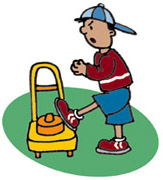Occasionally we catch glimpses of our children imitating our behavior. It can be very cute, or it can be a staggering, frightening experience. A toddler tries to do push-ups on the living room floor, just like his dad. He grabs his plastic razor and strains to see the mirror as his dad is shaving. Then, they are in the car together, caught in a traffic jam, and the boy shouts, “Move it, people!”—or something worse.
mirror as his dad is shaving. Then, they are in the car together, caught in a traffic jam, and the boy shouts, “Move it, people!”—or something worse.
Older children will be less obvious, and it may take longer before we see them copying us, but the imitation is just as real. Only now, the stakes are higher: they’re making moral choices, forming lasting relationships, perhaps dating, driving, and making decisions about what they want to pursue in life.
Modeling is where our true influence as fathers shows up, because important values are caught more than they are taught. Children learn more from watching our lives than from listening to what we say. Each day, in hundreds of ways, we communicate to our kids, “Follow me.”
This presents both a dilemma and an opportunity. It’s a dilemma because our children will use our lives as reference points, for better or worse, by design or by default. It’s also an opportunity to be intentional about demonstrating for our children what a responsible, calm, caring, self-sacrificing father is like.
WHAT TO MODEL
EMOTIONAL MATURITY
Ron was in the back yard, cranking on his fourteen-year-old lawn mower. After so many years and so  many repairs, the old beast just wouldn’t start. Ron’s frustration mounted. After cranking and cranking for several more minutes, Ron accidentally brushed his hand against the pull cord, which was so hot it burned him. In his frustration, he gave the mower a swift kick.
many repairs, the old beast just wouldn’t start. Ron’s frustration mounted. After cranking and cranking for several more minutes, Ron accidentally brushed his hand against the pull cord, which was so hot it burned him. In his frustration, he gave the mower a swift kick.
As he stood there stewing in emotion, he heard someone behind him. There was his two-year-old son, pushing his plastic lawn mower. Sure enough, the boy reared back and kicked that little mower, just like his dad.
Emotional maturity is among the most important qualities in life, and your children—especially your sons—learn by watching you. Too many dads hide their emotions, perhaps thinking they are a sign of weakness. If they do show an emotion, it’s usually anger. Maybe they were raised in homes where feelings were rarely discussed, certain topics were forbidden, and family members rarely said “I’m sorry” or “I love you.”
 But we need to learn to express emotions in healthy ways—whether we cry over a loss, maintain control during frustrations, or celebrate an achievement. Our kids need to see that vital part of who we are. And even when we lose control emotionally, those can be positive times if we take time to go to our children, confess that we were wrong, apologize, and talk about better ways to handle emotions.
But we need to learn to express emotions in healthy ways—whether we cry over a loss, maintain control during frustrations, or celebrate an achievement. Our kids need to see that vital part of who we are. And even when we lose control emotionally, those can be positive times if we take time to go to our children, confess that we were wrong, apologize, and talk about better ways to handle emotions.
RESPECT FOR WOMEN
Mark is a young father who learned a valuable lesson about the powerful impact his words and actions have on his child. One day, a ten-year-old neighbor boy told Mark that he had a new girlfriend. What was Mark’s next question? That’s right: “Is she pretty?” It seemed harmless at first, but as Mark thought about it, he realized that in that brief conversation he had classified the girl’s appearance as more important than a dozen character traits that actually have much higher value.
Sons get most of their ideas about relating to women from their dads. With that in mind, ask yourself: What am I demonstrating for my son? You don’t want him to value women only for their appearance, but are your words and actions contradicting that? Even at a very young age, your son will soak up your habits.
Sometimes boys show disrespect for women in other ways: they may manipulate their mothers, rebel against their teachers, and be very insensitive to their sisters. They may “play hardball” to get their way. So, teaching a son to respect women includes doing what’s necessary to help him control his aggressiveness. He needs to know that Dad plays hardball, too—not with physical or verbal abuse, but with a firm resolve to confront him and hold him accountable for his disrespect.
 We dads must demonstrate and defend the notion that women are to be valued for their fascinating character, their integrity, and the feminine traits that complement our masculine approach.
We dads must demonstrate and defend the notion that women are to be valued for their fascinating character, their integrity, and the feminine traits that complement our masculine approach.
With a daughter, try thinking of your modeling as training to help her spot counterfeits. A good way to teach people to spot counterfeit bills is to make them very familiar with the real thing. If they have a detailed awareness of the authentic, they are able to spot a counterfeit right away.
As a father, it’s your responsibility to be that “real thing” as your daughter learns to relate to boys. Even as a young girl, she’s trying to figure out men, and you’re her closest and best example of one. What’s appropriate? How will men respond when she flirts for attention? As her father, you play a large role in showing her what a proper, respectful response sounds and feels like. Without that model, she may not know what to expect from men. She may not be able to see through the irresponsible, insensitive, dishonest men she meets along the way.
She needs lots of your attention, affirmation, and healthy physical affection. But make it clear that she has won your heart because she is a fascinating and worthwhile person. Show her that there are men who are consistent, trustworthy, and sensitive to her needs.
INTEGRITY
As fathers, we’re always on camera. Our children’s movie cameras capture scenes and sounds that they replay and relive again and again. With our character and integrity, we can never yell, “Cut!” and do it over.
We can’t hide the truth from our families, and that should put some pressure on us. Our “walk” needs to be consistent with our “talk.” We need to be careful about keeping our promises. If we teach our children to value honesty, can we ask them to tell someone on the phone that we aren’t there? If we work to instill a respect for authority, is that consistent with the radar detector on the dashboard? If we lament the rise in teenage pregnancies and preach abstinence, can we still watch the popular TV show where premarital sex is expected and even cheered? Can we tell our children to respect their elders and then bad-mouth our in-laws? Modeling integrity is a full-time, lifelong job.
Dad, what are you modeling for your kids—through your action or inaction? Maybe a better question is, Are you willing to make permanent lifestyle changes to make sure you’re sending a consistent message? Is it too much to ask you to give up your favorite TV show or get rid of the radar detector?
These may not seem like big issues now, but realize that your modeling lasts many years for your child. Someday your son or daughter will be faced with important life decisions. How can he defend truth if he hasn’t seen truth in action? When your daughter is confronted with some wild philosophy at college, will she think, “What would my dad do?” and make a wise choice? Or, will she think, “Well, dad said this, but he usually did something else”?
Disciplining our children is another common test in this area. We want to produce self-disciplined, confident people who make wise choices, take responsibility for their actions, and proactively work to fix their problems. But often, our own methods work against that goal. We may explode at our kids for not having self-control, or yell at them for not being respectful. A big part of disciplining children is demonstrating the behavior we expect from them—showing them that the right way is more worthwhile and fulfilling than the alternatives.
Our inconsistency plants seeds of confusion and exasperation in our children. They are depending on us to be models of integrity.
HOW TO MODEL
BE INTENTIONAL
The good news is that our positive words and actions are also recorded by our children’s movie cameras, and they make impressions that are just as vivid and long-lasting as the negative ones.
Maybe it’s an image of you going back to a store because the clerk didn’t charge you enough. Maybe it’s going out of your way to help someone along the side of the road. It might be a phrase or a tone of voice—the endearing way you speak to your wife, or the words, “I was wrong. I’m sorry. Will you forgive me?”
Clarence, an African American man, has a vivid memory from when he was nine years old. One day at a gas station, some men verbally abused his father because of his skin color. Clarence’s father didn’t retaliate or even acknowledge the denigrating remarks. At the time, Clarence was ashamed of his dad for not standing up to them, but now, many years later, he tells the story with pride because his father exercised courageous restraint.
Golf legend Chi Chi Rodriguez tells about a time when his father caught one of the neighborhood boys stealing bananas from a tree in their yard. Instead of pressing charges, his father climbed the tree, cut down some bananas, and then took Chi Chi with him to deliver them to the boy and his family.
You can tell your kids about the principles that are important to you; you can spout platitudes ‘til you’re blue in the face. But when you show them with real-life examples, the lessons really stick.
Dads, we have extraordinary power in modeling. But we need to make sure that when we say, “Follow me,” we know exactly where we’re going.

